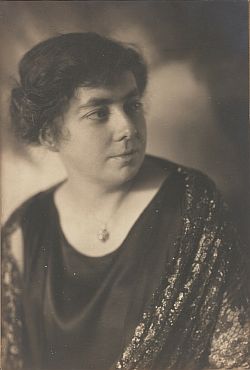

Partner Henrica Maria "Ru" Paré
Queer Places:
Kon. Sophiestraat 24A, 2595 TG Den Haag, Netherlands
Theodora Versteeghstraat, 2641 RG Pijnacker, Netherlands
 Theodora Jacomina Petronella "Do" Versteegh (December 13, 1888, Kerk Avezaath - October
20, 1970) and 'Ru' Paré (1896-1972) got to know each other when Ru moved to
The Hague in 1919. In The Hague she registered at the Royal Academy for Visual
Arts, where she met the painter Jan Toorop. Theodora Versteegh studied singing
with Cornélie van Zanten and Tilly Koenen and had already started her career
as an alto. Do and Ru had a lesbian relationship. During the war both refused
join the 'Kulturkammer'. With Ru's resistance group the couple saved over
fifty Jewish children and also a number of adults. Ru Paré, nicknamed 'Aunt
Zus', coordinated the resistance work, wich consisted mainly of finding foster
families, contacts and providing falsified identity cards. With her concerts
Theodora Versteegh provided the necessary money.
Theodora Jacomina Petronella "Do" Versteegh (December 13, 1888, Kerk Avezaath - October
20, 1970) and 'Ru' Paré (1896-1972) got to know each other when Ru moved to
The Hague in 1919. In The Hague she registered at the Royal Academy for Visual
Arts, where she met the painter Jan Toorop. Theodora Versteegh studied singing
with Cornélie van Zanten and Tilly Koenen and had already started her career
as an alto. Do and Ru had a lesbian relationship. During the war both refused
join the 'Kulturkammer'. With Ru's resistance group the couple saved over
fifty Jewish children and also a number of adults. Ru Paré, nicknamed 'Aunt
Zus', coordinated the resistance work, wich consisted mainly of finding foster
families, contacts and providing falsified identity cards. With her concerts
Theodora Versteegh provided the necessary money.
Theodora Jacomina Petronella 'Do' Versteegh was the daughter of Jacob Arnoldus Versteegh (1836-1891) and Anna Wilhelmina Theodora van Lidth de Jeude (1849-1916). Theodora (Do) Versteegh was born on the Teisterbant estate in Avezaath Church, a village near Tiel, where her father was a wealthy gentleman farmer. Do hardly knew him, because he died when she was three years old. After his death, the family moved to Tiel, where Do grew up in a family with five children.
Music was important at home. As a young girl, Do was already successful when she sang in children's operettas, and she took piano lessons with Sem Dresden. Because she turned out to have a beautiful alto voice, she quickly switched to vocals. She went to the Koninklijke Nederlandsche Toonkunstenaars Vereeniging in Arnhem, where she was taught by Marius A. Brandt Buys, who married her sister Mathilde (1883-1959) in 1904. In 1913 she made her debut in Tiel in Handel 's Joshua . After she passed her exams in 1915, she lived in Amsterdam for a short time. In 1919 she moved to The Hague, where she met Ru Paré. It became a friendship for life. She took singing lessons with Cornelie van Zanten and Tilly Koenen.
In 1915 Do Versteegh met the soprano Jo Vincent. Together with tenor Evert Miedema and bass Willem Ravelli they formed the Jo Vincent Quartet, which performed all over the country with religious music, made records (in London) and also performed a lot for the NCRV radio. But above all, Do Versteegh made a career as an oratorio singer. In 1924 she sang with the Utrecht Toonkunstkoor under the direction of Johan Wagenaar as a soloist in the Mattheus Passion - the first of a total of about 250 times that she would perform this alto part in her life. Versteegh also became known internationally. She has performed with such famous conductors as Bruno Walter, Willem Mengelberg, Eduard van Beinum and Zoltán Kodály. In the thirties she became active as a singing teacher.
When Do Versteegh was asked by state commissioner Seyss-Inquart to perform at his home at the beginning of World War II, she made up an excuse to get out of it (she 'made no new commitments'). In 1942 she refused to register with the Kultuurkamer, and went into hiding after receiving a call from the Sicherheitsdienst (SD) to report. Clandestien gave them house concerts. In March 1945 Do Versteegh lost everything during the bombing of the Bezuidenhout, where she lived in the Koningin Sophiestraat (no. 24). On March 22, she placed an advertisement in Het Vaderland with the call to deliver her sheet music. She was offered stuff from all sides, including the Steinway wing that had been from Seyss-Inquart. After the liberation she sang at various liberation and grief concerts. However, her career did not get going again and on December 27, 1948 she said goodbye to the concert stage. Together with Ru Paré, she moved into Ru's parental home in the Haagse Van Beuningenstraat, where they each had their own household and Versteegh continued her practice as a singing teacher. Theodora Versteegh died on October 20, 1970. She was cremated in silence.
Theodora Versteegh made numerous recordings for the Columbia label. On her farewell she was knighted in the Order of Orange-Nassau and received the Belgian Knight's Cross of the Order of the Crown. She was praised for her 'fine musicality, sharp intelligence and an exemplary developed technical background' ( Algemeen Handelsblad , 28-12-1948). In 1971 Ru Paré and others founded the Theodora Versteegh Foundation. The foundation, which still exists, focuses on promoting scientific voice research and speech therapy. Some places (Hengelo in Overijssel, Pijnacker) have a Theodora Versteeghstraat.
The archives of Theodora and Ru are kept at the Dutch Music Archives. In the town of Pijnacker there is a Theodora Versteegh street and a Ru Paré boulevard.
My published books:p>